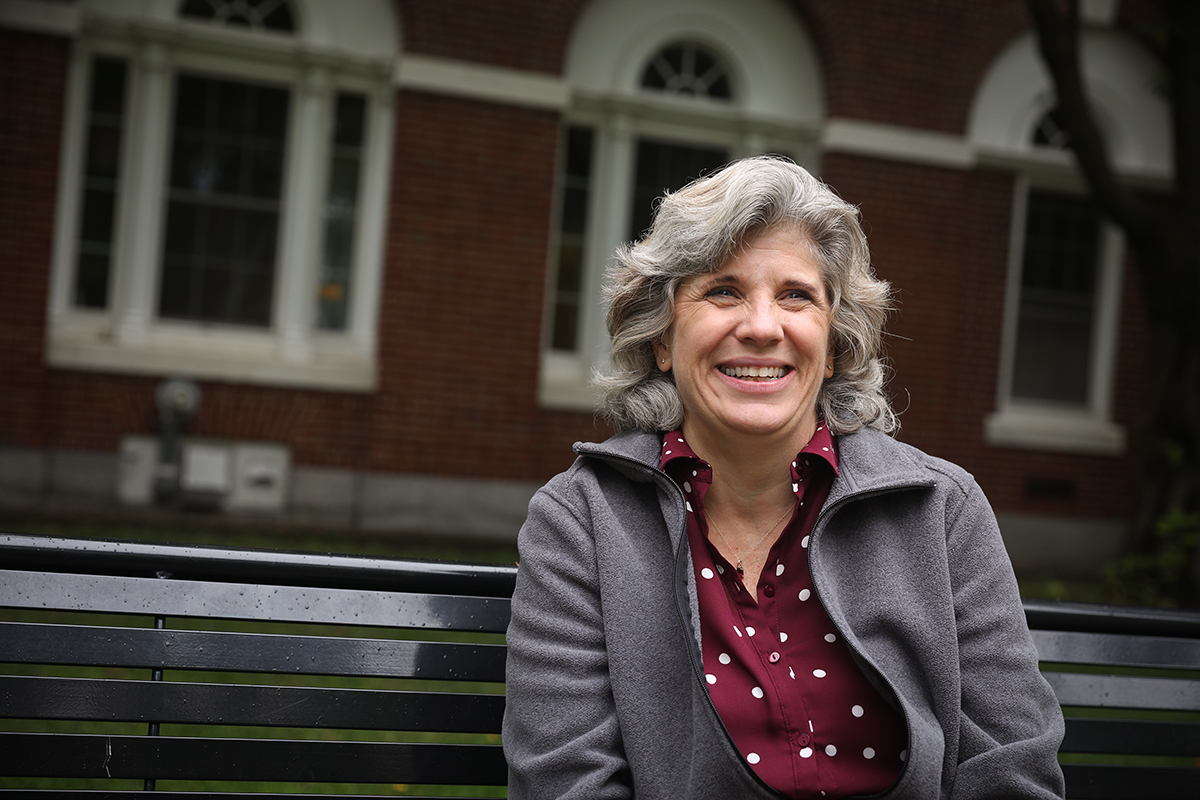Carol Cahalane

Name an Exeter dorm and odds are good that Dean of Residential Life Carol Cahalane has spent time there as an affiliate, faculty resident or dorm head. “In reverse order, Dunbar, Bancroft, Kirkland, Lamont, Moulton and Gould,” she says. “And that doesn’t even include my summer school assignments!”
In her more than 30 years at the Academy, Cahalane has taken on many roles including as an instructor in health education, an adviser to numerous student clubs and as an associate dean of students. In her role as dean of residential life, Cahalane works closely with dorm heads to ensure students are placed in a living environment where they can thrive.
We sat down with Cahalane to talk about how dorm life contributes to Exonians’ development as young adults, and how the more than 800 boarding students are supported by dorm faculty, affiliates and each other.
Q: What’s your favorite part about being associated with the dorms?
“Getting to know the students and being able to be of assistance to them in real time with all sorts of things. It may be, ‘I don’t know how to figure out this math problem,’ or ‘I need to talk to my mother, but she’s not answering my call,’ or ‘I’m having a fight with my roommate.’ Helping students work through those issues and empower them to be agents of change for themselves and for others.”
Q: How do you feel students’ experiences in the dorm contribute to their education and development as young adults?
“Dormitory living is very much in line with the Academy’s mission of uniting goodness and knowledge. The dorms are particular spaces where students can develop some sense of belonging and engagement. This allows them to try things they might never have even considered or talk to new people, or live with people whom they might not have chosen for themselves initially. Through our efforts to make our dorms as diverse as possible, we’re really trying to build a mixture of viewpoints so that students rub elbows with all sorts of people and maybe discover new things about themselves in the process.”
Q: We often hear from alumni that their most lasting relationships started in the dorm. In what ways do students rely on their dorm mates for support?
“Our new students don’t always understand the power of their peers. They’re often students who are bright and motivated and worked hard elsewhere and got very good grades. But we set the bar high here, and that challenge can initially be a stumbling block for them. It’s an adjustment that their dorm mates can often help them through. More experienced students are able to explain to new students that they’re not expected to just know everything, but that they are expected to try, ask for help, and then check their results with their classmates or their teacher. It doesn’t take long for a new student to become somebody who can extend a hand to somebody else.”
Q: Many students take on leadership roles within the dorms. Why do you think this is important?
“I think in any community we need people to understand that their behavior matters and that they matter. That it doesn’t happen in a vacuum and it has ripple effects on other people. When I talk with students about leadership, I usually say, ‘You don’t have to be in a particular role to be a leader, but rather to care about the community and think about the community’s needs, rather than just your own. Think about how you can make a positive impact on the people around you.’”
Q: They don’t live on campus, but all day students are affiliated with a dorm. Why?
“All of our students are members of our community, and dorms are an important place of connection. Day students have always found their own ways of connecting with the dorms, but in the last five to six years, we’ve become more intentional about that. We started to affiliate day students with dorms and this year we have officially affiliated day student proctors within each dorm. The day student proctors provide an important point of contact between day students and the dorm and encourage day students to get involved in dorm-based events or to just stop by to hang out.”
Q: How does the dorm setup foster the development of responsibility within the students?
“We do expect that students who are here are trustworthy and we hold them to that. We don’t have millions of rules. We say you may not leave the dorm after check-in, but our doors are not alarmed, so a student could leave the dorm after check-in without notice. If they did that, that’s a huge violation of the trust that we have established. We don’t have study halls where we stand over students and watch them studying, but in the dorms we have study hours where we expect that they’re using the time appropriately. It’s a big responsibility to get your work done. We will coach them and guide them and help them when they stumble, but a student who is here needs to be ready to develop that internal motivation. That’s what we’re looking to do. We don’t want this to be, ‘I do the right thing when I’m watched and I do whatever the heck I want when I’m not,’ but rather, ‘I do the right thing.'”